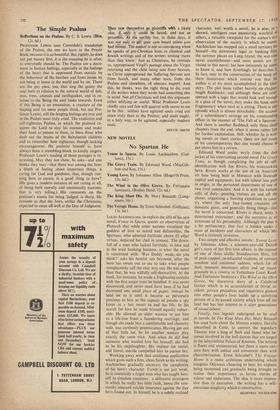The Simple Psalms
Reflections on the Psalms. By C. S. Lewis. (Dies, 12s. 6d.) PROFESSOR LEWIS uses Coverdale's translation of the Psalms, the one we have in the Pia* Book, because it is so beautiful. But, rightly, he does not put beauty first, it is the meaning he is after, as everybody should be. The Psalms are a docu- ment in human feelings, especially in the feelings of the heart that is oppressed from outside by the behaviour of the heathen and from inside by not being at home in the world and by sin. There are the gay ones, too, that sing the gaiety the soul feels in relation to the natural world of fish, seas, trees, animals and earthquakes, and in re- lation to the Being the soul looks towards. Even if this Being is an emanation, a creature of the leaping soul (as some people think, but not Pro- fessor Lewis), still the leaping feelings are true and in the Psalms most truly cried. The vindictive and self-righteous Psalms, in which the psalmist re- quires the Lord to slay his enemies and make their food as poison to them, to bless those who dash out the brains of the Babylonish children and to remember how righteous, though lacking encouragement, the psalmist himself is, have always been a stumbling-block to kindly singers. Professor Lewis's reading of these passages is in- teresting. May they not show, he asks—and one thinks they may—that there was among the Jews a depth of feeling about important things, a caring for God and goodness, that, though run- ning here to excess, is a good thing to have? (He gives a modern instance of not caring at all, of being both morally and emotionally moronic that is very telling.) His comments on the psalmist's mania for being 'judged' is sharp. He reminds us that the Jews, unlike the Christians, expected to come off well at the Day of Judgment. They saw themselves as plaintiffs with a likely case, if only it could be heard, and not as prisoffeVs. At the earthly bar, in thoie days, it
was not easy O ypur case heard urileis you had rit'Ori:eY. The author is not so convincing when he speaks of pre-Ohristian hints in classical and Jewish writings and of the writers writing 'more than they knew.' Just as Christians, he reminds us, appropriated Virgil's passage about the Virgin returning and the child being sent from heaven, so Christ appropriated the Suffering Servant text from Isaiah, and many other texts, from the Psalms and elsewhere, of obscure import. And this, he thinks, was the right thing to do, even if the writers when they wrote had something else in mind. Not all Christians will find this argument either edifying or useful. What Professor Lewis chiefly says and few will quarrel with seems to me to be this : seldom have agitated souls cried out more truly than in the Psalms; and souls ought, in a holy way, to be agitated, especially modern souls.
STEVIE SMITH


































 Previous page
Previous page